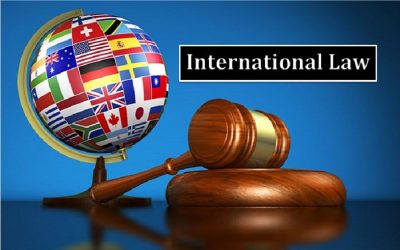Do Canada’s Unilateral Sanctions Violate International Law?

All Global Research articles can be read in 51 languages by activating the “Translate Website” drop down menu on the top banner of our home page (Desktop version).
***
Is Canada breaking international law when it applies unilateral coercive economic measures that are commonly referred to as sanctions?
Most countries and international law experts believe sanctions are only legitimate when approved by the World Trade Organization or United Nations Security Council. Economic sanctions outside the framework of the UN charter are generally considered “unilateral” and unlawful. According to the Asian-African Legal Consultative Organization report “Unilateral and Secondary Sanctions: An International Law Perspective”, “the imposition of unilateral and secondary sanctions on countries through application of national legislation is not-permissible under international law.”
So US sanctions on Cuba, Iran, Venezuela, Syria and elsewhere clearly violate the UN charter. Rather than a nonviolent measure, they are akin to a medieval siege designed to starve a city or fortress into submission.
Unilateral sanctions run afoul of the principle of self-determination and people’s right to development. In The International Covenant on Economic, Social and Cultural Rights a trio of authors note: “Unilateral economic sanctions (as opposed to multilateral UN measures under Chapter VII of the Charter) imposed by one State or group of States on another, to compel the latter to change a particular political or economic policy, could amount to a prohibited intervention and a denial of self-determination.” Similarly, the UN Human Rights Council recently reaffirmed that “unilateral coercive measures are major obstacles to the implementation of the Declaration on the Right to Development.” Last month the Human Rights Council approved a resolution 30 to 15 (with two abstentions) urging all states to stop adopting unilateral sanctions as they impede “the right of individuals and peoples to development.”
In recent years the Canadian government has adopted unilateral sanctions against a host of countries including Venezuela, China, Russia, Nicaragua and others. In a sign of Ottawa’s growing employment of sanctions as a tool of coercive statecraft, Canada adopted legislation modeled after the US Magnitsky Act and Global Affairs created a Sanctions Policy and Operations Coordination Division in 2018. At the time they put up $22 million over five years to enforce their sanctions regime.
Alongside the US, UK and EU, Canada sanctioned a Chinese state agency and four officials recently. Individuals assets in Canada were frozen and they are prohibited from travelling here or doing business with Canadian firms.
Two years ago Canada sanctioned nine Nicaraguan government officials, including ministers and the president of the National Assembly, in coordination with Washington. A June 2019 media note released by the US State Department declared “Canada’s sanctions actions today illustrate the international commitment to Nicaraguans’ cause, signaling clearly that President Ortega’s insufficient and self-serving measures are not nearly enough to address Nicaraguans’ demands for democracy, basic rights, and freedom from repression.”
Canada has adopted four rounds of sanctions against Venezuela since 2017. These moves reinforced and legitimated US sanctions that have contributed to tens of thousands of deaths. According to the preliminary report by the UN Special Rapporteur on the negative impact of unilateral coercive measures, Alena Douhan, “the [Venezuelan] government’s revenue was reported to shrink by 99%, with the country currently living on 1% of its pre-sanctions income,” which has impeded “the ability of Venezuela to respond to the Covid-19 emergency.”
Not only a possible violation of international law, Canada’s first round of sanctions on Venezuela may have actually contravened domestic law. According to lawyer Andrew Dekany the August 2017 sanctions weren’t in accordance with Canadian legislation stating that international sanctions be adopted only as part of international alliances. As such, the Trump administration aided the Trudeau government by creating the US-Canada “Association Concerning the Situation in Venezuela” to conform to the existing sanctions legislation. In a Venezuela Analysis article titled “Do Canadian Sanctions Against Venezuela Violate Canadian Law?”, Dekany wrote, “there is no reason for Canada to ‘create’ this association but for its desire to help the U.S. out [by sanctioning Venezuela], having failed to persuade the one obvious organization (Organization of American States) which it had democratically joined to, among other things, act in such a way.”
Partly to sidestep the requirement to sanction in accordance with international institutions the federal government adopted the Justice for Victims of Corrupt Foreign Officials Act (or Magnitsky law), empowering it to freeze individuals’ assets/visas and prohibit Canadian companies from dealing with sanctioned individuals. These sanctions are presented as simply targeting corrupt officials, but they have broader impacts. They dissuade broader commercial relations with a country and often legitimate harsher US measures. Whether they are in compliance with the UN charter is unclear. In her September report “Negative impact of unilateral coercive measures: priorities and road map: Report of the Special Rapporteur on the negative impact of unilateral coercive measures on the enjoyment of human rights”, Douhan questions “the legality of sanctions imposed on individuals and non-State entities, especially due to the proliferation of Magnitsky-like acts.”
Trudeau and his ministers regularly claim to promote an “international rules based order” with the No. 1 priority on Global Affairs’ website “revitalizing the rules-based international order.” As such, it’s remarkable how little discussion there is of whether unilateral Canadian sanctions violate international law.
*
Note to readers: please click the share buttons above or below. Forward this article to your email lists. Crosspost on your blog site, internet forums. etc.
Featured image is from OneWorld

